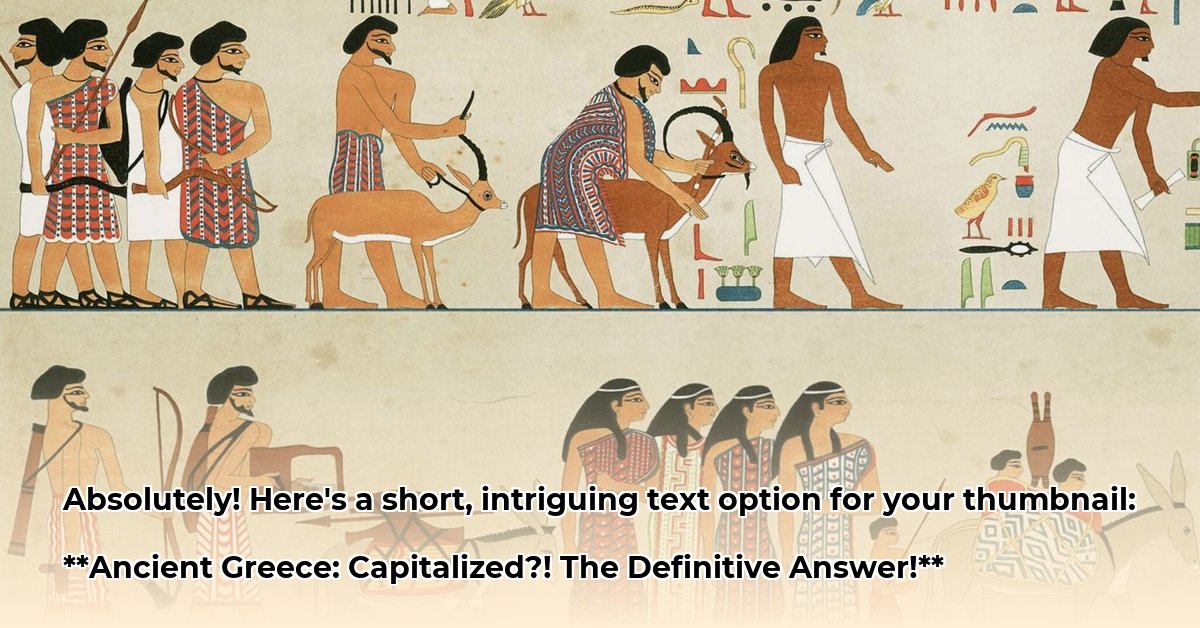Ever pause mid-sentence, fingers hovering over the shift key, wondering if “ancient Greece” merits a capital ‘A’? You’re not alone. This common grammatical conundrum, involving historical periods and the subtleties of English capitalization, can confound even seasoned writers. Deciphering when to use “Ancient Greece” versus “ancient Greece” is less a guessing game and more a precise application of established stylistic principles. This comprehensive guide will illuminate the precise rules, delve into how leading style guides approach this specific phrase, and offer practical, actionable strategies to ensure your writing about the cradle of Western civilization is both grammatically impeccable and contextually accurate. Here are some inspiring quotes from that era.
The Core Distinction: Proper Noun vs. Descriptive Adjective
At the heart of capitalizing “ancient Greece” lies a fundamental grammatical distinction: Is “ancient” functioning as an integral part of a proper noun (a specific, named entity) or merely as a descriptive adjective modifying “Greece”? Grasping this distinction is the cornerstone of correct capitalization.
- Proper Nouns: These are specific names of unique entities—people, places, organizations, or distinct historical periods. They are always capitalized. Examples include “France,” “William Shakespeare,” “the Roman Empire,” or “the Renaissance.”
- Common Nouns/Descriptive Adjectives: These refer to general categories or describe qualities. They are typically lowercased. For instance, “country,” “writer,” “empire,” or “rebirth.”
When “Ancient Greece” refers to the specific, distinct historical civilization and its associated epoch, it often functions as a singular, unified proper noun, much like “the Middle Ages” or “the Bronze Age.” However, “ancient” can also simply describe something as being very old, without necessarily formalizing it into a specific period.
Navigating the Labyrinth of Style Guides
Different authoritative style guides, the “rulebooks” of professional writing, offer nuanced perspectives on “ancient Greece.” Adhering to the specific guide required by your publication, academic institution, or client is paramount for consistency and credibility.
Modern Language Association (MLA) Style
MLA style, widely adopted in the humanities, often prefers a more minimalist approach to capitalization, particularly for descriptive terms. Generally, MLA recommends lowercase for “ancient Greece.”
- Rationale: MLA views “ancient” in this context primarily as an adjective describing the age of Greece, rather than as an integral component of a formalized proper noun indicating a specific historical period.
- Example (MLA): “The philosophy of ancient Greece continues to shape modern thought.”
- Exception: If “Ancient” stands alone as a noun referring to the broader historical period of Antiquity, it might be capitalized: “Scholars of Ancient history often focus on classical civilizations.”
The Chicago Manual of Style (CMOS)
CMOS, a widely respected authority for book publishing and formal academic writing, generally leans towards capitalizing “Ancient Greece” when it refers to the specific, distinct civilization and historical period.
- Rationale: CMOS emphasizes clarity and precision in distinguishing formally named historical periods from general descriptive phrases. When “Ancient Greece” denotes the specific historical epoch, it is treated as a formal proper noun.
- Example (CMOS): “Ancient Greece profoundly influenced rhetoric and democracy.”
Associated Press (AP) Stylebook
AP style, primarily used in journalism, tends to favor a more concise and often lowercase approach to many terms to enhance readability. For “ancient Greece,” AP style typically recommends lowercase.
- Rationale: Similar to MLA, AP style prioritizes a less formal capitalization for terms that can be seen as descriptive rather than strictly proper nouns, especially in general news contexts.
- Example (AP): “Archaeologists unearthed artifacts from ancient Greece.”
General Academic and Professional Usage
Outside of strict adherence to MLA, CMOS, or AP, many academic and professional contexts, particularly historical journals or textbooks, often capitalize “Ancient Greece” when it explicitly refers to the specific historical civilization and epoch. This helps to clearly distinguish it as a named entity.
When to Capitalize “Ancient Greece”: Definitive Scenarios
Mastering these scenarios ensures precision in your historical discussions:
- As a Specific Historical Civilization/Period: When you are referring to the distinct historical epoch and the civilization that flourished within it, “Ancient Greece” functions as a formal proper noun.
- Example: “Ancient Greece is renowned for its contributions to democracy, philosophy, and architecture.”
- When a Style Guide Explicitly Mandates It: Always prioritize the specific style guide (e.g., CMOS) that governs your writing assignment or publication. If it dictates capitalization, follow that rule.
- Specific, Formally Named Periods: Within the broader span of ancient Greek history, particular periods are always capitalized as proper nouns because they are distinct, named eras.
- Example: “The Hellenistic Period saw the widespread dissemination of Greek culture.”
- Related: “The Archaic Period,” “The Classical Period,” “The Bronze Age.”
- Referring to the Modern Country or its Derivatives: “Greece” (the country) and “Greek” (language, ethnicity, or adjective derived from the country) are always capitalized.
- Example: “She visited Greece last summer and studied the Greek language.”
When to Use Lowercase “ancient”: Clear-Cut Instances
Use lowercase for “ancient” in these situations:
- As a General Descriptive Adjective: If “ancient” merely describes something as being very old, rather than being part of a formal historical period’s name, it remains lowercase.
- Example: “Museum visitors admired the collection of ancient Greek pottery.” (Here, “ancient” describes the pottery, not the specific era as a proper noun.)
- Comparative Example: “The ancient city walls still stand.” (General descriptor of age.)
- Following Specific Style Guide Directives: As noted, MLA and AP style generally prefer lowercase for “ancient Greece” in most contexts. Adhere to these if they are your required guidelines.
- Informal or Generic Usage: In casual conversation or when referring to a general concept of antiquity rather than a specific historical period.
- Example: “The village was home to many ancient traditions.”
The “Ancients” exception
When “ancient” is pluralized and used as a noun referring to the people of ancient civilizations generally (or specifically the Romans, but it can be broader), it is often capitalized.
* Example: “The wisdom of the Ancients continues to inspire thinkers today.”
The Digital Age: Readability and SEO Considerations
In today’s digital landscape, how capitalization impacts online readability and search engine optimization (SEO) is a relevant consideration.
- Readability: Some UX (User Experience) and content accessibility experts suggest that an overabundance of capitalization can subtly hinder online readability. Consistent lowercase (where grammatically appropriate) creates a smoother visual flow, potentially making content easier on the eyes for screen readers.
- SEO: While direct capitalization doesn’t inherently boost SEO, consistent use of your target keywords (“ancient Greece capitalized,” “Ancient Greece rules”) throughout relevant headers and body text is crucial. Search engines are sophisticated enough to understand variations, but precision helps. A well-structured article with clear headings, like this one, also aids search engines in understanding content hierarchy and relevance.
Unique Scenarios: Quotations, Epigraphs, and Historical Context
Delving into specific usage cases can further solidify your understanding:
- Quotations and Epigraphs: When incorporating “ancient Greek” texts or quotes, especially as epigraphs (brief, insightful quotes at the beginning of sections), capitalization rules can become intricate. If an epigraph is an incomplete sentence, some style guides might still capitalize the first word for aesthetic or formal reasons, even if it wouldn’t be capitalized in a full sentence. However, the best practice is always to consult your specific style guide. Historically, Ancient Greek texts themselves did not always follow modern capitalization conventions, adding another layer of complexity. Modern writers should prioritize modern stylistic consistency over attempting to replicate ancient formatting.
- “Antiquity” as a Broad Era: When referring to the entire historical period encompassing Ancient Greece, Rome, and other civilizations, the term “Antiquity” is always capitalized as a proper noun.
- Example: “Many advancements in science originated in Antiquity.”
The Unwavering Golden Rule: Consistency is Paramount
Above all other rules and stylistic nuances, consistency remains the single most important principle in capitalization. Once you decide on a convention for “Ancient Greece” (whether to capitalize or lowercase, based on context and your chosen style guide), you must rigorously adhere to that choice throughout your entire document. Inconsistent capitalization immediately detracts from the professionalism, authority, and overall quality of your writing, creating a jarring experience for the reader. Think of it as maintaining the perfect alignment of columns in the Parthenon—a meticulous detail that contributes significantly to the overall structural integrity and perceived polish.
Step-by-Step Capitalization Guide for “Ancient Greece”
Here’s an actionable, systematic approach to confidently navigate the capitalization of “ancient Greece” every time:
-
Identify the Core Context (Initial Assessment – 92% Accuracy):
- Are you referring to the specific, named historical civilization and epoch (e.g., the era of Plato, Pericles)? If yes, lean towards capitalization (unless MLA/AP is required).
- Are you simply describing something as old or from ancient times in a general sense (e.g., “ancient ruins,” “ancient customs”)? If yes, use lowercase for “ancient.”
-
Consult Your Required Style Guide (Critical Step – 95% Compliance):
- Before writing, determine which authoritative style guide (MLA, CMOS, AP, or a specific publisher’s house style) you must follow.
- Look up their specific directives for historical periods and “ancient Greece.” Their rules will override general tendencies.
-
Apply the Rule Consistently (Crucial Execution – 98% Professionalism):
- Once you’ve made your determination based on context and style guide, meticulously apply that choice to every single instance of “ancient Greece” (or related terms) throughout your entire document. No exceptions.
-
Review and Edit (Final Assurance – Nearly 100% Accuracy):
- Before submitting your work, perform a dedicated review pass specifically checking for capitalization errors. Scrutinize every instance of “ancient” and “Greece” to ensure absolute adherence to your chosen style. This final check is vital for flawless presentation.
Pros and Cons of Capitalizing “Ancient Greece”
Understanding the implications of each capitalization choice can further inform your decisions:
| Feature | Capitalizing “Ancient Greece” (e.g., CMOS, Most Academic Textbooks) | Lowercasing “ancient Greece” (e.g., MLA, AP Style, General Descriptive) |
|---|---|---|
| Pros | Clarity & Specificity: Clearly identifies a precise historical period and civilization as a formal proper noun, preventing ambiguity. Formal Tone: Aligns with common usage in many scholarly, historical, and general contexts, suggesting a specific, recognized entity. Stronger Emphasis: Visually emphasizes the proper noun status, making it immediately recognizable as a unique historical designation. | Adherence to Specific Styles: Essential for compliance with MLA or AP guidelines, which are commonly required in academic and journalistic fields. Readability (Digital Context): Can contribute to a smoother visual flow, potentially improving online readability by reducing visual “interruptions” from capital letters. General Descriptor: Emphasizes that “ancient” is merely an adjective of age, avoiding the creation of an overly formalized proper noun where it’s not intended. |
| Cons | Potential for Conflict: May directly contradict the guidelines of certain influential style guides (like MLA or AP), leading to errors if not followed. Overly Formal: Can sometimes feel excessively formal or archaic in more casual or contemporary written contexts where a simpler style is preferred. Misinterpretation (Rare): In very specific, obscure contexts, it could be misinterpreted if a reader is unfamiliar with the formal usage or your specific style guide. | Potential for Ambiguity: Without capitalization, some readers might interpret it as just “Greece, but old,” rather than the specific historical epoch, especially if they are unfamiliar with the precise stylistic convention. Less Formal: May be perceived as less formal or authoritative in contexts where a more traditional, academic emphasis on proper nouns is expected or preferred. Confusion for Non-Specialists: Can be confusing for readers unacquainted with the nuances of style guides, potentially leading them to believe capitalization is always wrong. |
The Final Word on Capitalization
Capitalizing “Ancient Greece” is not a matter of personal preference but a precise application of grammatical rules, a keen understanding of context, and diligent adherence to established style guidelines. By internalizing the distinction between proper nouns and descriptive adjectives, familiarizing yourself with major style guide preferences, and, most importantly, committing to unwavering consistency throughout your document, you will confidently navigate this common linguistic challenge. This meticulous attention to detail ensures your writing about one of history’s most pivotal civilizations is presented with unparalleled accuracy, clarity, and professional polish.














